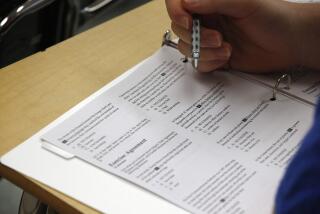Abuse of SAT Time Extensions
- Share via
* Re your Dec. 6 editorial, “Stop the SAT Games”: Will “students with learning disabilities” who are given “special treatment” in the SAT college entrance exam also be given “special treatment” in all college exams? If not, then there is no point trying to push them through what could be very tough and perhaps even heartbreaking educational experiences. Will they be given “special treatment” also in their professions after college?
For the truly learning-disabled, it is perhaps more realistic and beneficial if educators and parents look into providing other learning channels and job opportunities that will suit the learning capabilities of each of such students.
CHUNG H. TSANG
Arcadia
* Rather than passing legislation to make it more difficult for “rich, white . . . boys” from “private schools and public schools in wealthy suburbs” to obtain extra time on the SAT, perhaps we need to reexamine the relevance of the three-hour time limit on this all-important “make it or break it” test. We suggest that it would make more sense to allow every student all of the time he or she requires to adequately demonstrate his or her knowledge. It’s time to stop the stopwatches altogether!
NIKO MILONOPOULOS, Age 13
THEO MILONOPOULOS, Age 13
Studio City
* The 1.9% who receive extended time for their SAT tests may seem “only a tiny percentage” but that is nearly one in 50 students (Dec. 1). In the audit you cite, 18.2% of these students’ files showed that their basis for extended time was suspect. In my observation, there are far more undeserving cases; expensive “educational psychologists” make a lot of money documenting cases in such a way that their wealthy clients won’t get caught. And the children are not trying to make the average 1,000 on the SAT. They want to score big. The highest SAT scorer at one top Orange County school in one recent year had extended time. He garnered a coveted space at UC Berkeley.
SATs can be very helpful to colleges, which wish to know which children grasp information readily, which children read well, which children can apply what they have learned. This otherwise useful tool is seriously hampered by our haphazard reliance on special testing for the privileged.
CATHY TEAGUE
San Juan Capistrano
More to Read
Sign up for Essential California
The most important California stories and recommendations in your inbox every morning.
You may occasionally receive promotional content from the Los Angeles Times.










